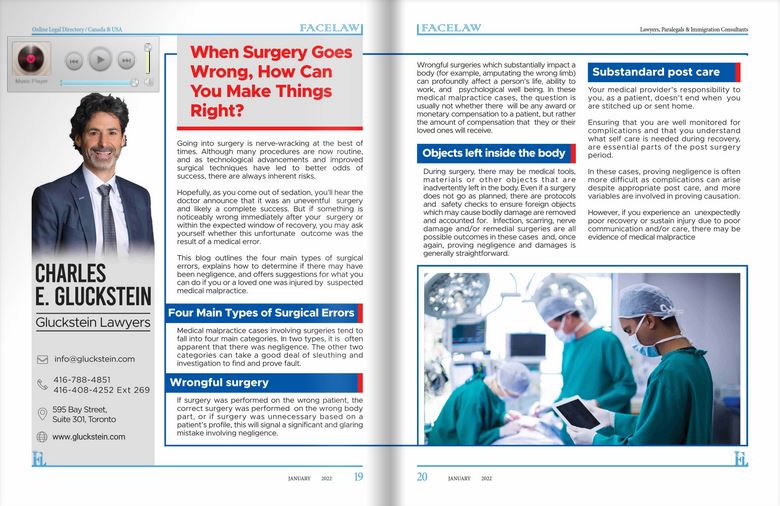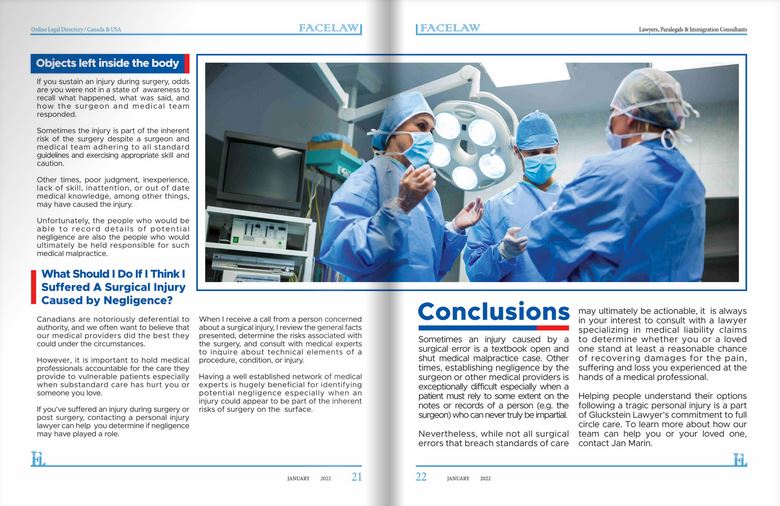When Surgery Goes Wrong, How Can You Make Things Right?
When Surgery Goes Wrong, How Can You Make Things Right?
By Jan Marin, Personal Injury Lawyer
Going into surgery is nerve-wracking at the best of times. Although many procedures are now routine, and as technological advancements and improved surgical techniques have led to better odds of success, there are always inherent risks.
Hopefully, as you come out of sedation, you’ll hear the doctor announce that it was an uneventful surgery and likely a complete success. But if something is noticeably wrong immediately after your surgery or within the expected window of recovery, you may ask yourself whether this unfortunate outcome was the result of a medical error.
This blog outlines the four main types of surgical errors, explains how to determine if there may have been negligence, and offers suggestions for what you can do if you or a loved one was injured by suspected medical malpractice.
Four Main Types of Surgical Errors
Medical malpractice cases involving surgeries tend to fall into four main categories. In two types, it is often apparent that there was negligence. The other two categories can take a good deal of sleuthing and investigation to find and prove fault.
Wrongful surgery – If surgery was performed on the wrong patient, the correct surgery was performed on the wrong body part, or if surgery was unnecessary based on a patient’s profile, this will signal a significant and glaring mistake involving negligence. Wrongful surgeries which substantially impact a body (for example, amputating the wrong limb) can profoundly affect a person’s life, ability to work, and psychological well-being. In these medical malpractice cases, the question is usually not whether there will be any award or monetary compensation to a patient, but rather the amount of compensation that they or their loved ones will receive.
Objects left inside the body – During surgery, there may be medical tools, materials or other objects that are inadvertently left in the body. Even if a surgery does not go as planned, there are protocols and safety checks to ensure foreign objects which may cause bodily damage are removed and accounted for. Infection, scarring, nerve damage and/or remedial surgeries are all possible outcomes in these cases and, once again, proving negligence and damages is generally straightforward.
Substandard post-care – Your medical provider’s responsibility to you, as a patient, doesn’t end when you are stitched up or sent home. Ensuring that you are well monitored for complications and that you understand what self-care is needed during recovery, are essential parts of the post-surgery period. In
these cases, proving negligence is often more difficult as complications can arise despite appropriate post-care, and more variables are involved in proving causation. However, if you experience an unexpectedly poor recovery or sustain injury due to poor communication and/or care, there may be evidence of medical malpractice
Injury during surgery – If you sustain an injury during surgery, odds are you were not in a state of awareness to recall what happened, what was said, and how the surgeon and medical team responded. Sometimes the injury is part of the inherent risk of the surgery despite a surgeon and medical team adhering to all standard guidelines and exercising appropriate skill and caution. Other times, poor judgment, inexperience, lack of skill, inattention, or out-of-date medical knowledge, among other things, may have caused the injury. Unfortunately, the people who would be able to record details of potential negligence are also the people who would ultimately be held responsible for such medical malpractice.
What Should I Do If I Think I Suffered A Surgical Injury Caused by Negligence?
Canadians are notoriously deferential to authority, and we often want to believe that our medical providers did the best they could under the circumstances. However, it is important to hold medical professionals accountable for the care they provide to vulnerable patients – especially when substandard care has hurt you or someone you love.
If you’ve suffered an injury during surgery or post-surgery, contacting a personal injury lawyer can help you determine if negligence may have played a role. When I receive a call from a person concerned about a surgical injury, I review the general facts presented, determine the risks associated with the surgery, and consult with medical experts to inquire about technical elements of a procedure, condition, or injury.
Having a well-established network of medical experts is hugely beneficial for identifying potential negligence – especially when an injury could appear to be part of the inherent risks of surgery on the surface.
Conclusions
Sometimes an injury caused by a surgical error is a textbook open and shut medical malpractice case. Other times, establishing negligence by the surgeon or other medical providers is exceptionally difficult – especially when a patient must rely to some extent on the notes or records of a person (e.g. the surgeon) who can never truly be impartial.
Nevertheless, while not all surgical errors that breach standards of care may ultimately be actionable, it is always in your interest to consult with a lawyer specializing in medical liability claims to determine whether you or a loved one stand at least a reasonable chance of recovering damages for the pain, suffering and loss you experienced at the hands of a medical professional.




Click here to visit Charles E.Gluckstein’s Page for further information
lawyer in toronto
list of experience lawyers in toronto
top lawyer in toronto
list of lawyers in toronto
lawyers in canada
top lawyer in canada
list of lawyers in canada
lawyer in canada
brain injury lawyer in Canada
birth injury lawyer in Canada
slip and fall lawyer in Canada
personal injury lawyers in Canada
wrongful death lawyer in Canada
injury lawyer in Canada
long term disability lawyer in Canada
Medical malpractice lawyers in toronto
spinal cord injury lawyer in canada
accident lawyer in Toronto
car accident lawyer in Toronto
bicycle accident lawyer in GTA
Slip and Falls lawyer in GTA
Long term disability lawyer in Toronto


